Zoologists Matt and Liz Raad were destined to be Australia’s leading experts on red kangaroos, until they fell in love with business.
Now the couple specialize in business valuation, with years of experience buying, renovating and selling businesses, and they’ve saved many business owners from selling out at less than their company is worth.
In this guest appearance, Matt and Liz share their system for finding out the real value of a business.
Podcast: Download (Duration: 41:10 — 37.8MB)
Get Notified Of Future Episodes Apple Podcasts | Spotify | Amazon Music | Android | Blubrry | Gaana | TuneIn | Deezer | Anghami | RSS | More
In this interview
01:48 – From red kangaroos to buying and selling businesses
04:16 – What the internet did for Matt and Liz
07:26 – Do you know what your business is really worth?
10:04 – The two-part valuation system
14:43 – What part do owner’s wages play?
18:38 – Stickiness is actually a private equity term
20:25 – The quantity and quality of traffic
24:12 – What does the history look like?
25:40 – The last-minute change that can unsettle things
29:35 – What niche does to value
34:01 – Have you got the buyers?
37:58 – Summing things up
Boost your business value with help from James inside JamesSchramko membership
Transcription:
James: James Schramko here. Welcome back to SuperFastBusiness.com. This is Episode 704. And today, we’re going to pose the question, is your business worth more than you think? And for that I’ve brought in business experts Matt and Liz Raad. Welcome.
Liz: Thank you, James.
Matt: Good day, James, how are you going?
James: I’m going great. Now if you hear any extra birds in the background, I’m recording outdoors today. I’ve decided to get a little bit of fresh air and enjoy the lovely warm summer weather here in Sydney. And also there’s a tradesperson in my house drilling. That was the driver of the choice. But the content that we’ve got is so important today, we really had to press ahead and ask this question. Because in the business you’re in, you get to see a lot of deals going through with website sales and online businesses. I’d love to get just a little snapshot into your background, where you came from and how you ended up in that field. And then let’s talk about some of the subtleties of how we might be able to determine if our business actually has any value or not.
Liz: Fantastic.
Matt: Cool.
From red kangaroos to buying and selling businesses
Liz: All right. Well, I mean, if you want to go right back, we’re actually zoologists.
James: That’s so bizarre. I don’t know if I have any other ex-zoologists in my catchment.
Matt: We were actually Australia’s leading experts on red kangaroos, or destined to be Australia’s leading experts on red kangaroos.
Liz: But then business captured us. So we actually got into our very first business very young, but very determined. And our process, we kind of, we went through buying that business. And the wonderful thing about being trained as scientists is that we’re very much into experimentation. So everything was always, Okay, what can we do? Let’s put it in action, see what happens, and then adjust from there.
Matt: And we should mention, we had to, because we knew nothing about business at all. We grew up on farms. And when we bought that business, it was going backwards. We didn’t know that at the time; we were given the wrong advice. And so that kind of got us fascinated. Okay, well, now we’re going to go bankrupt here. What do we do to turn this around? And I guess we had to learn how to do things pretty quickly. So we’re all self-taught. And we did really well. It was a manufacturing business.
Liz: Yeah. And that became a driving passion of ours, because we never wanted to be in that situation again. And so we devoted a lot of our life and time and study to, Okay, what gives a business value? And how do we avoid that situation? And also, how do we quickly and easily grow value in a business? And so we started actually buying and selling businesses. This was in the offline world 20 years ago; there weren’t any internet businesses, and so we’d buy and renovate and then sell businesses. And we kept doing that, and after a while we did it so much we actually ended up starting doing that professionally. So we got into business broking. And we were working in big deals in Sydney, mergers and acquisitions, and with private equity.
Matt: High net worth.
Liz: Yep.
Matt: Very, very successful entrepreneurs, we were lucky enough to work with. And so it was just fascinating. We got to see how all these guys would value businesses and why they would buy them. And basically, we applied exactly what we’d learnt doing that with websites, when the internet came along, and it just went gangbusters for us. It was…
Liz: So much easier.
Matt: So much easier. So in a nutshell, basically what we do today is what we used to do with bricks and mortar businesses, but we do it online.
Liz: We find value and realize it.
James: Wow. I mean, what an epic journey from zoologist through to you know, the heavy-hitting M&A stuff. That’s serious bickies.
Matt: Yeah.
What the internet did for Matt and Liz
James: And this online thing. I mean, it sounds like we have a few parallels, because when I was at Mercedes-Benz, I was thinking how restrictive it was just being able to sell one product in one geographic area versus the worldwide internet. And I set about trying to figure out how to build a website so that I could reach a bigger market. And then I had to figure out what I would sell. But once I did, it just opened the doors for me. And now I imagine you’ve got an enormous amount of choice and options available to you, which could possibly paralyze someone who’s thinking about going into what you’re talking about.
Matt: Totally. We’re like little kids in a candy shop. This is like a dream come true. Doing what we do online is literally, we can find or go any which way we want. And you’re right, there is just so much opportunity. But Liz and I these days, we’ve focused it down, we’ve got very set strategies of what we buy. And because of our background, our background bricks and mortar was always manufacturing or wholesale import businesses. And that meant we always had our whole net worth tied up in stock in a warehouse somewhere in Western Sydney. So we don’t ever want to go back to that. So online, one of the big, big drivers for us is we avoid ecommerce sites, like, anything to do with stock. Not to say you can’t make tons of money out of it. That’s just our, because of our background with dealing with so much stock. We found it so much easier online. We just deal with electrons. All we do is sell advertising, basically, they’re the only sites we kind of buy. Advertising, information and other people’s products or affiliate sites.
James: What about memberships?
Liz: Oh, yeah.
Matt: Yes.
James: And what about services?
Liz: We don’t tend to be service.
Matt: We sell leads for services. So we always get a commission. That’s how we prefer to do it.
James: Gotcha.
Liz: We just drive traffic.
Matt: We drive traffic. Yeah, web traffic.
James: I’ve definitely avoided ecommerce sites, but I did build and sell a couple of agencies – a website development agency and a search engine optimization agency. And I was a bit like you, I went on that learning mission. There’s lots of SuperFastBusiness episodes in the past, talking to people about buying businesses, talking to people about selling businesses. And in a way, I was using that as my research tool to figure out how to structure things. And then of course, I went on into revenue share deals, where I can have a piece of the action without necessarily having ownership, but getting paid for the upside, profit, sort of, you know, money coming in, nothing going out, and no liability. I’m just wondering, how many websites would you hold in a portfolio at any one time? Do you keep them? Do you just buy and sell them quickly? Is it like having a lot of stock on hand, or do you just take it one at a time?
Liz: It varies. And when we’ll go deal by deal, so we have some that we intentionally buy knowing that we’re going to renovate them and sell. And then most of them, though, we are buy and hold. We intend to hold for the long term. And what our goal is, whenever we buy a website, is to pay that asset back to ourselves from the cash flow as soon as possible. So then we’re trying to minimize risk as much as possible, and basically get our investment back. And then we’re pretty free and clear. And that’s just cash flow. So yeah, like you just said, the goal is to own these assets, basically free and clear, and then purely profit. And that’s a really nice position to be in.
Do you know what your business is really worth?
James: Great. So we’ve established a bit of the background, how you got into this, and what you’re doing now. You were mentioning to me some interesting information about the fact that you’ve encountered a few business owners who were sitting on a really valuable asset and didn’t realize it. And you’ve had a few people asking this question, you know, how much is my business worth? And you’ve discovered that often, it’s a lot more than they think. So I’d love if you could tell us a bit about this topic.
Liz: Yeah.
Matt: Oh yeah, we keep seeing this all the time. And because of…
Liz: Because we’re value hunters…
Matt: We just take it for granted that, you know, we can see the value, we know what businesses are worth, and it’s kind of funny for us. Sometimes it’s a bit strange, someone will be telling us about their website, particularly website businesses these days, and we’re kind of looking at them going, you know, that’s probably worth at least half a mil sitting there. And they get very excited, because they had no idea.
And as Liz was saying to you before, earlier, we literally keep getting people saying, I’m going to close down my business. And one of the most recent ones was actually a student of ours. She had an ecommerce site, my favorite kind, joke. But she’d had it for 10 years and she was just sick of it. It’s a classic story. most business owners after about 10 years will get sick of their businesses. And she’d said to us, I’m just going to close the doors and walk away. And I asked her, give me some stats – what sort of traffic, how long have you been around? What sort of revenues are you doing? And when she sent it back on email, I said, I think we’d better book her for a call with me, better have a chat there. And this is a business who’s going to close down. And she ended up, we told her how to go ahead and sell it and who to approach and how you set it up. And she did it, go. She did exactly as I said. This was over the course of just a couple of weeks. She had it sold, she got 80 grand for it. This is a business she was going to walk away. So that was for the database. And then out of that, the buyer also offered her a six-figure job plus commissions on sales. So, not bad.
And she’s free and easy. She’s not tied to the business anymore. And it’s more a mindset change for her. And we see this all the time, with even ourselves, when we used to sell our own businesses, and with a lot of clients who have businesses they just want to get away from. That’s freed up her whole life just mindset-wise, because she’s now free and clear.
James: That’s amazing. Look, I love how much you’ve been helping people. I’ve been exposed to that, because we’ve been doing some work together since I first met you at a conference, some while back now. And the more I get to know about your life, the relationship you have with your kids, your dedication and passion to sports, and how much you care about your customers with your events, the content that you’re publishing, I know you’ve got a good heart.
The two-part valuation system
And I believe you’ve started developing a system to help people figure out how valuable their business is. You want to talk about that?
“Selling a business is one of those things that most people only ever do once in their whole life.”
Liz: When we value a business, there’s two parts to valuation. So do you want us to get into that and describe that? I think that would probably help a lot of people. Because I think selling a business is one of those things that most people only ever do once in their whole life. And so it’s not a skill you tend to develop. You’re really busy doing the stuff in your business, doing the things that you know you need to do to grow that business and to make things happen. But what you’ve got is this beautiful asset that has an incredible amount of value. But you can really not realize the full potential of that value if you don’t understand how at the end point, it’s actually going to be valued and sold. And there’s two parts to that valuation – there’s the profit multiplier, and then there’s what we call our value adders, the value points in a business that kind of dial up or dial down that profit multiplier. Because when someone buys a business, whether they’re a high net worth or private equity firm or multinational or down to your ma and pa investor, what they’re looking for is a return on their investment. They want to put money in and get as much return as they possibly can from it. So generally, to start with, you value a business based on how much money it’s making. For a small business, that’s usually somewhere between one year to three years’ profit. And for most people, for most smaller businesses, let’s say it’s making $100,000 a year. That means it’s valued somewhere between $100,000 and $300,000. Now, what the magic is, is there’s a lot of difference between that, getting $100,000 for your business and getting $300,000 or add another zero to that, getting a million or three million. So wouldn’t you like the extra two million in your pocket just for knowing a few little extra things? So what we specialize in is knowing how to dial up that profit multiplier, because that one to three times is only actually the beginning. We’ll get into that in a minute, I guess.
Matt: And that’s actually what you teach, James.
Liz: Yes.
Matt: The profit multipliers you’ll see fit exactly the sorts of things you’re teaching in SuperFast.
Liz: Yeah. So that profit multiplier, somewhere between one to three times, but then we get into those value adders. Now, for a website, number one is, and if it’s an offline business, we call it the property of the business, like the assets and the things that the business owns. But for a website business, it’s usually around the domain name, the content and the network, that establishment in the marketplace and the connections and network that that business has within the marketplace. Because that’s something that a new buyer or someone coming in in competition will find hard to create.
Matt: That’s particularly attractive to big corporate buyers as well, at the moment. If you want to do the 10 million-plus kind of deals, you’ve got to have a well-established website. It’s got to have a good property, you know, online presence that goes with it.
James: Gotcha. So you want to, basically, it’s if you’re going to own it and keep it for 10 years, what assets would you like to have if you wanted to lock up the market? You want to make sure it comes with those things?
Liz: Yeah, beautiful.
Matt: Exactly. So that’s point number one.
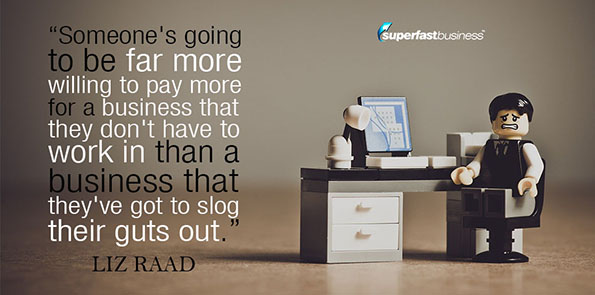 Liz: Point number two is around, especially for smaller buyers, it’s around the lifestyle kind of thing. But for larger buyers, it’s about whether they can take this business and just have it run without them and either put a manager in there or add it to another business. And that’s around the systems and the automation of that business. And the more systemized and the more automated that business, the higher the value, because obviously someone’s going to be far more willing to pay more for a business that they don’t have to work in than a business that they’ve got to slog their guts out.
Liz: Point number two is around, especially for smaller buyers, it’s around the lifestyle kind of thing. But for larger buyers, it’s about whether they can take this business and just have it run without them and either put a manager in there or add it to another business. And that’s around the systems and the automation of that business. And the more systemized and the more automated that business, the higher the value, because obviously someone’s going to be far more willing to pay more for a business that they don’t have to work in than a business that they’ve got to slog their guts out.
Matt: And we’re seeing that a lot now with, as Liz just mentioned, I just want to highlight it, is interesting, this is with smaller website deals. There’s a lot of people want to get out of their PAYG jobs, or skip the commute, so they’re happy to pay good money with multiples for businesses that are very automated so that they can run on the side or do that transition from PAYG.
Liz: And it’s interesting, the valuations have changed so much over the ten years that we’ve been investing in this marketplace. It was common back when we started to buy websites at three times monthly multiples, three to five times monthly. Oh man.
Matt: At least we made some money.
Liz: But then 10 to 12 times was good buying.
Matt: That’s monthly.
Liz: Monthly, sorry. And in websites, we usually go by monthly profit rather than yearly. Now though, a good solid business with systems in place and running nicely is usually around 20 to 30 times multiple.
What part do owner’s wages play?
James: Right. And that’s what I’ve always worked, to a multiple of some around two times annual profit as a sort of baseline number. But you know, one of the interesting things when it comes to profit is if the owner’s been using some of the business income to fund their life and then if they’re drawing a salary and what their commercial wage might be valued at. Can you speak to that?
Matt: Yeah. That’s a really interesting point. And it’s actually simpler than typically a lot of accountants make out. When you’re at the practical end of selling a business or a website, we always add, do what we call, add those back. And basically, it can become a negotiating point. So what I mean by that is, the classic accountant and valuing businesses kind of 101 is, you’ve got to have a commercial viable wage in there to run the business. Now, when you’re operating as a broker, you argue the case on that and say, Well, no, that’s not the case. Because what you define as a, whose definition is, what’s that worth. So we always do an add back. So if the owner is pulling money out of the business, which they should be, we just form that up as part of the net profit. Then sure, we go in and negotiate that at the end. So what that means is, in a nutshell, for businesses under a million dollars, small businesses or particularly business under 100 grand, the reality is, the profit is what the owner’s pulling out of it. And that’s a good thing.
James: It’s pretty much the profit is their wage, right?
“An interesting perspective on running lifestyle expenses out of the business.”
Matt: Yeah. And lots of business owners, don’t be scared of running lifestyle expenses out of the business. A good broker or good intermediary or advisor should be able to pull those expenses out and point out to the buyer, Look, this business is really cool – the owner’s sitting back making three hundred grand a year. And you know, out of that they’re traveling around the world, they’ve got a car, they’ve got an office that they’re paying off for their superfund, all that sort of stuff. That’s really what they pull out. You now need to go away with your account and make a decision, what’s it worth to you. But that’s how we build up the value in a business. That’s one of the ways we do it.
James: That’s a great tip. So basically, look for all the perks and make that part of the profit, which is going to get multiplied for the value.
Matt: Yeah. So actually, we’re helping someone right now sell a particular website business. It just came through to us the other day. And I said to him the magic question, Okay, how much profit do you make each year? And he thought it was just 100 grand a year. And I was saying, Well, what else do you do in the business? And he’s using it to fund another growth of another business; this guy’s an entrepreneur. But what’s really important is, coming back to this point, to systemization, when he says, I’ll pull out 100 grand a year, it turns out there’s plus lots of other perks that he’s pulling out of business, but the big one is on systemization. He’s a systems guy. So he barely works in the business. It’s basically under management. So that immediately makes any money he pulls out of there worth a lot of money, because he doesn’t actually have to put a lot of effort into the business. So anyone that comes into that business, if they want to run it themselves, they can just add the manager’s fee to their net profit. So they’re suddenly making a lot of money out of it, whereas he’s had to pay a manager’s fee to do it. So it’s worth way more than what he expected, that business. He was only going to sell it for 100 grand or something, and we’re saying no. It’s probably worth three times that.
James: It’s funny, I had the reverse thing happen recently. I helped a client buy out his partner. And he ended up, instead of paying 2 million, he paid 300,000 for his half share. So I saved him.
Matt: Right.
James: Two and a half million dollars. Because you know, it’s like that great saying: never believe a statistic you haven’t manipulated yourself, you can do a lot with the spreadsheet and the numbers. If you have a good understanding of them, and if you can argue a point, it can really make a big difference to the bottom line.
Matt: It is so true.
So, by the way, just for a recap, what was number one on the list?
Liz: The property. The domain name, the content, network and the website.
James: So what’s number three? Systems was number two.
Stickiness is actually a private equity term
Liz: Then, certainly in terms of website businesses, but all businesses, the list. Like, the list of buyers, the database of people, the following. And a lot of it is around the loyalty and stickiness of that.
Matt: Can I jump in with this and point out that James, you’ll find this interesting – believe it or not, stickiness is a private equity term.
Liz: Yeah.
Matt: When you’re dealing with website businesses, and they’re doing those big $10 million deal plus or $50 million deals, they literally look at the stickiness of your email or your database.
James: Right.
Liz: Or your website.
Matt: So it’s how much are they engaged with you or coming back. Because that’s what a big corporate’s buying – if they’re going to write you a check for $60 million, and you’ve got a big following, they want to know that that following is sticky. It’s going to stay with them. And that to them is worth mega bucks, which it is to all of us, you know, it’s pretty obvious, but it’s a really important thing. So if you can show your email open rates, or even if you’ve a big social media following, any kind of following that you have or list you have, if you can prove that it’s really sticky, that’s worth big dollars.
Liz: The DAU and MAU – daily active users and monthly active users.
James: That’s a nice one. Again, when I sold my business, the bigger one did have a pretty sticky recurring database. In fact, I’m still getting paid now on some original subscriptions, and I sold that business three and a half years ago.
Matt: Nice.
James: And I was collecting the money in trust, because I tied them to a PayPal account that couldn’t be transferred. So there was still a way around that, you know, collect the money and then reimburse it on a regular basis. I’ve still got legacy customers from my old cart from six and seven years ago, which is fascinating, right? Sticky, sticky, sticky like Spiderman.
Liz: Yeah.
The quantity and quality of traffic
James: What would number four be?
Matt: Traffic.
Liz: The traffic. The people.
James: Oh, alright. And which traffic sources are considered good and which ones are considered risky?
Matt: So first and foremost, traffic’s about quantity and quality. And that’s what’s considered good.
Liz: It’s organic. They want rankings. They want a site that is coming up in organic rankings, but they want diverse traffic as well.
James: Right. Not single-point sensitivity. So it’s not all just off one Facebook funnel paid ads. It’s not just all your traffic’s coming from one keyword that’s ranking, etc.
Liz: Yes. Because that increases risk.
James: Of course.
“The more low-risk we can make it, the higher the valuation.”
Liz: Obviously, and it’s everything you teach, James. What we’re doing is making this purchase as low-risk as possible for the buyer. And the more low-risk we can make it, the higher the valuation.
James: Funny story around that, is that my biggest risk with my business was that one customer was buying half the supply. And I turned that into the positive, making it impossible for him not to buy the business, because he was going to get a 50 percent rebate on every dollar he’s spent with the business and use that to fund the purchase. I thought it was genius. So I tell you what, the thing that was most risky for me was the least risky for him, because he knows that he can control 50 percent of the business once he owns it.
Liz: Yeah, perfect. And we actually had a friend who did exactly that – he built the website specifically to sell it to the main supplier. Because the supplier had no online presence, so he basically built a website to be the main distributor of that product in Australia via his website, and then at 10 days before in the financial year, 18 months after he started it, they came to him and said, Okay, yep, we want to buy you, here’s a mil.
 James: Right. So I call that the suck eggs approach. And the last three properties that I started developing, I already know the buyer. In my mind, I know exactly who’s buying it, and we are building the website they should have built. So we’re teaching them how to suck eggs.
James: Right. So I call that the suck eggs approach. And the last three properties that I started developing, I already know the buyer. In my mind, I know exactly who’s buying it, and we are building the website they should have built. So we’re teaching them how to suck eggs.
Liz: Yeah, beautiful.
James: Hopefully, they don’t listen to this podcast and they’ll be more than happy. It’s a little bit smarty pants, but it’s also very strategic, like, build the solution other people should have built. And here’s a funny little side story to that: the clients who I signed up when I quit my job at Mercedes-Benz, I used the exact same brief that I’d sent to the Mercedes-Benz head office for their website, that I had all these suggestions for improvement and like, how they could do their online marketing better. And I put together this big report. And they basically just shoved it in a bottom drawer and ignored it. So I took the exact same blueprint, and I sold that to a lawyer and a car dealer and they signed me up. And away we went. I was able to quit the job.
Liz: Alright.
James: So if you can build a plan that people can instantly recognize they should have done, by the time you’ve built it and you’re a long way down the track, they’ll rather just buy it than to go and create it themselves. Because you’ve put in the work. You’ve harvested the grapes, you’ve put them in the vat, you’ve waited seven years, and now you’ve got the fine red wine. If they want to get that fine red wine, they can either buy the bottle, or they can go and buy a vineyard and wait seven years and hope it works out.
Matt: That’s what we’re seeing in the market right now with the big, big buyers. They have no interest in building these websites themselves at the moment.
James: It’s kind of like Facebook buying Instagram and Microsoft buying LinkedIn and Lynda, etc.
So what about number five?
What does the history look like?
Liz: Okay, number five, harking back a little bit to the property and everything, is the history. So ideally, again, talking about low risk, we want to see a good consistent growth history. We want to see that it’s been established, obviously, the longer the better. And also in the history, it doesn’t actually matter if you’ve had down periods. That’s a normal part of the growth of the business. But it’s to see that that business has recovered from those hiccups or those dips. Ideally, you don’t want to be trying to sell your business when it’s on the down.
James: It’s actually pretty common, isn’t it? People lose interest and they stop sort of updating, and then they run it into the ground a bit and then they just sort of sell it for peanuts, because they’ve let it go off.
Liz: And actually, that’s a really good point, James. When you do decide to sell your business, when you’ve got that plan, okay, I want to sell, the most important thing, we’ve seen it so many times when we’re brokering, people kind of let the energy go, the emotion drops, and they suddenly stop doing the stuff in the business that they need to do to keep it going. And while it’s on the market, it starts dropping and dropping and dropping, and that’s the worst thing that can happen. So when you go into that sale mode and decide Yes, I’m going to sell the business, then is the time to really get focused and stay in the business just for the time when you’re selling it. Don’t let it go at that last minute.
The last-minute change that can unsettle things
James: Yeah, so you’ve just got to keep the momentum up even though. And I’ve also found, both with my business and with others, that there’s often, like, a last-minute change or something that shifts and tries to unsettle the deal or make it difficult and you can sometimes lose your cool and blow it. Have you seen that before?
Liz: Yeah.
Matt: Multiple times. One of our mentors, guy’s worth 50 mil-plus, and he bought and sold lots of businesses and we acted as a spotter for him. And he used to teach us. He’d say, Matt, you watch what happens when we’re negotiating with this particular private equity firm, whatever. Do what’s called EBIT grind. And so they agree to your sale price…
James: Yeah.
Matt: And then when they’re doing the due diligence process, and in particular, as they get closer to the cutoff date, they grind down the EBIT. They keep coming back every second day with their accountant saying, Can you please explain, like, this in your figures? And they basically grind down your EBIT and they try and prove that it’s not as high.
Liz: You should explain what an EBIT is.
“With website business, it’s pretty clear-cut what the profit is.”
Matt: An EBIT is your net profit, earnings before interest and tax. So in that instance, the good news there is, though, if you’ve got an advisor on board, it’s not a problem. Because it’s just a game that these guys play, especially the more aggressive venture capital firms or private equity or big time buyers. There’s certain groups that are well-known for doing that. The good news with website is that he was from, and this was when we were in the bricks and mortar business, what we’ve observed that with good website businesses, I haven’t heard of that happening as much. Because with website business, it’s pretty clear-cut what the profit is. Pretty hard to grind down the profit.
James: It might not just be profit, it might be that they figured out they have to, you know, they involve a lawyer to go through the terms and conditions and there’s one condition where typically what lawyers like to do is transfer all the risk to the other party if possible, because they know they’re going to get paid a lot of money to balance it back out from both lawyers working on it. It’s a classic lawyer trick, and one that I’m not fond of. Or, you know, some other buyer comes into the ring and offers something else, like what happens when you try and buy a property off auction. There’s always mysteriously another buyer who’s offering more just as you’re going to do the settlement. So just basically keep your eyes peeled until you get the keys to your business. Expect the unexpected would be my tip there.
What about number six?
Liz: Yes. In terms of actually, one quick story around the history. One thing we do want to actually add is that it doesn’t matter even if your business is being disrupted, even if it is in the downtrend. That doesn’t mean you can’t sell it. And actually, we’ve just helped a couple of our clients. They were being seriously disrupted by the internet. Like, they were a wholesaler and importer. They were really struggling because of the rise of Amazon and all the online retailers. But still, presented in the right way, we managed to help them get out of that business and get a decent sale price and come out. They were staring down the barrel of bankruptcy. It’s still possible, but…
James: They’d need an ambulance for that.
Liz: Don’t ever give up. Like, just because your business is, even if it is having stressors…
Matt: Handled in the right way, there’s always value.
Liz: There’s always value.
Matt: And they had a lot of history. History was really big, actually, with that particular business. And here’s a really cool thing, the outcome of that story, James. These guys are awesome operators because of their background in business as well, and they took like ducks to water with the internet because they’d been disrupted so much by the internet.
Liz: They were, fine, we’re going to use this damn thing.
Matt: They’re students of ours. They have $100,000 months now in profit, online, from businesses that I’m glad to say don’t involve stock.
Liz: No stock.
James: I can relate to that. It’s a beautiful thing, isn’t it?
Matt: It is a beautiful thing.
James: Everyone could do with 100-grand profit a month in their life. I can tell you from personal experience. It is a life-changer. And well done, them, being ducks to water.
Liz: Yeah.
James: So what about six? I’m so keen to know what’s six. That’s my favorite number, by the way.
What niche does to value
Liz: Ah, well, there you go. Six is around the niche, like, the topic. Like, the industry. If it was an offline business, that would be the industry it’s in, and thinking about the popularity and the trend of that niche and that industry. So obviously, if it’s a rising niche and a rising trend, it’s easier to show value and show potential ongoing value. So that’s the other thing when we’re selling a business, we need to show the buyer as much upside as possible. And if we’re in a rising trend in a rising market, obviously that’s a lot easier to show.
Matt: I can think of a really good example here. So particularly online, the niche is, if you want to maximize, we’re talking about value adders, right? You can make money in any niche online, but the big one’s currently here probably in Australia. Giving away some industry secrets, but I can tell you there are some big, big buyers in the travel niche, insurance niche, car niche…
Liz: Property.
Matt: Property. But finance, anything to do with finance, because the leads are worth so much. So the classic, what you would expect. They’re sort of the niches Liz and I take it for granted, presuming most people realize. Now you look at travel, that’s just enormous.
James: That was one of the first ones. It was the disruption of travel that put a lot of pressure on my parents’ travel agency and caused me to start paying attention to the internet.
Matt: Yeah.
James: Property was one of their first ones as well, from memory. Accommodation, and so forth.
Matt: Yeah, so there’s niches like that. And if the website is in one of those niches, they will be viewed as you know, highly valuable, or more so than say, if you had a website to do with red kangaroos or zoology. No one’s interested in that sort of stuff, unfortunately.
Liz: Sadly.
“If you can get into a good niche, big bonus points there, particularly with big corporates and stuff.”
Matt: Sadly not. So, yeah. So if you can get into a good niche, big bonus points there, particularly with big corporates and stuff.
James: That’s it. I’ve definitely widened my catchment. This is where people say that the riches are in the niches right? Especially if they’re American, because if an Australian says that, we say “neesh”.
Liz: That’s true.
Matt: Yeah, that’s true.
I’ve chosen really big markets for the content sites that we’re working on now that have broad appeal. And I’ve never been afraid of a general market. What are your thoughts on that?
Matt: If you can get it to rank and you can own a position in that marketplace, then it’s highly, highly valuable, because it is more competitive now. In those big competitive niches, everyone knows it’s a lot harder to get into. So the classic one we talk about all the time is travel, because we know there’s some big deals that have been done in there and we’ve worked with people in that space. And now I’ve always wanted to rank a site really highly in that. And travel, when you think about it, if you’d say the travel niche, far out, that’s broad. And similarly, let’s say the health niche, absolutely broad, massive niche. And we advise our students, when you’re starting out, always go really, really niche in a niche like health. But like you’re saying, if you can go broad, and you’ve got a good-ranking site that’s broad, then yes, it’s definitely worth big bucks. You’ll see it day in, day out. Anything in the health niche that’s broad.
Liz: And that plays on history and position in the marketplace and all the other points of value within a business, if you can successfully create a system that drives leads and makes profit in a competitive niche. And that leads us to number seven, which is around the competition. Competitive niches. If it’s a business that can compete or is doing well in a very competitive niche, that’s more highly valuable, of course, than a business that’s in a very small, quite tight niche.
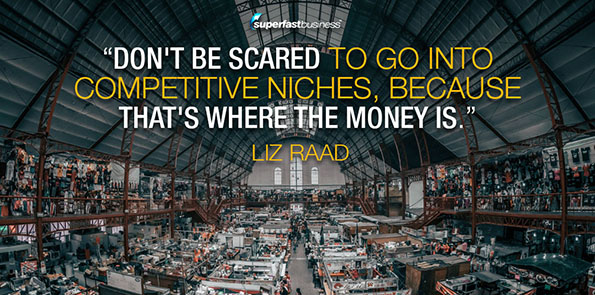 Matt: So similar to what you’re saying, James, you know, you’re saying never be scared of going broad. We also say, very closely aligned to that, what Liz is saying, don’t be scared to go into competitive niches as well, because that’s where the money is.
Matt: So similar to what you’re saying, James, you know, you’re saying never be scared of going broad. We also say, very closely aligned to that, what Liz is saying, don’t be scared to go into competitive niches as well, because that’s where the money is.
James: Yeah, and it reminds me of Richard Koch’s star principle for investing. He wants the fastest-growing company in the fastest-growing market.
Matt: Yeah.
James: And that’s his recipe for success.
What about eight? Bring us home with the big finale.
Matt: This is our favorite one. This is how you turbocharge everything.
Liz: And you touched on this before, James.
James: I like turbos. Can you supercharge it, as well?
Matt: Yeah. The cliche is, this is how you make money out of thin air, but it is. With business sales, we learnt this when we did bricks and mortar, and we see it with website businesses. Believe it, it is kind of a wealth mindset thing, too, when you think about it. When you sell a business for, say, under a million dollars or under 500 grand, it sells on a one-to-three-times multiple, it actually gets easier, the bigger the business goes.
James: Right.
Have you got the buyers?
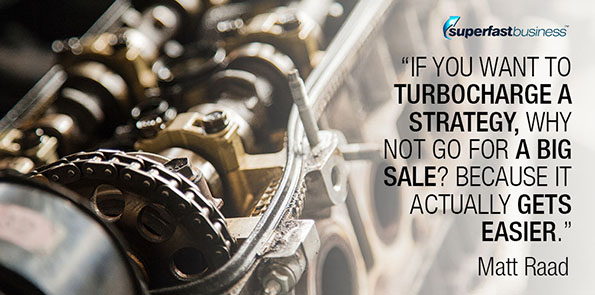 Matt: So our point number eight is having the buyers. And in particular, like you said earlier in the podcast here, kind of knowing who your buyers are going to be and setting it up for sale. If you want to turbocharge a strategy, why not go for a big sale? Because it actually gets easier.
Matt: So our point number eight is having the buyers. And in particular, like you said earlier in the podcast here, kind of knowing who your buyers are going to be and setting it up for sale. If you want to turbocharge a strategy, why not go for a big sale? Because it actually gets easier.
Liz: So a good example of this is a business that, actually, some guys who we know in the mergers, M&A space.
Matt: A merchant bank in Sydney.
Liz: Yeah.
Matt: And what they found was, there was a lovely ma and pa couple in a particular niche here in Australia who were ranked on page one, and it’s a very competitive niche. And these guys, they were struggling. They weren’t making the big money. They were doing okay. This was their full-time business; they were doing okay, but it was tough for them. And I think they were just making money out of AdSense, which is, that’s ok. Now, if they tried to sell that website business to an ordinary buyer on the ordinary marketplace, they would have sold it for less than a million dollars. But luckily, they did meet these guys, this merchant bank. And these merchant bankers were telling us, because Liz and I did a bit of work with these guys. And it’s a really, really interesting story. What they did, they had an idea of who the buyers could potentially be – big corporate buyers, very, very well known here in Australia; very high net worth; basically the biggest media buyers in Australia. But not just one, there were several of them. And so what they did, the merchant bank, they went to position number two in Google at the time in this niche, and they said, Look, we’ve got an opportunity here – we can volt you both together. By doing that, we get your net profit up. It’s a far more attractive proposition to these potential buyers. And we can sell out for way more money than what you are at now. And the bottom line is, they did (I’m not allowed to say the actual price in case anyone knows who I’m talking about), but it was eight figures. Millions. So this ma and pa who were struggling, seemingly overnight became multi-multi-millionaires, and are very, very happy.
Liz: And that was purely through the magic of valuation and stepping up the profit multiplier to that next level. So even if it’s under a mil, generally we’re still looking at it somewhere between one to five times. And that’s kind of where you can get to, because you’re looking at buyers who often have to get financed, often have to raise money, do all those things.
James: It’s not often someone will get all the cash up front, is it?
Matt: Yeah, very rare.
James: Very rare.
Liz: Whereas, once you step up to that level of over a mil, and so maybe somebody, you know, some of your listeners might be thinking, Okay, well how – this is the way to make it easy on yourself, rather than slogging your guts out to try and build a bigger and bigger business. What you can do is be a bit smart and think about all right, well, how could I – and exactly what you’re teaching, too, James – who could I work with? How could I bolt together in order to create a bigger business quite quickly, that hits that nice magic EBIT of a mil or more. And then you start to get to the point where we’re talking five to 10 times multiples, or if you get bigger than that, and even list on the stock exchange, we’re talking up to 25 times multiple. And this is the same business, but the valuations are different, because of what can be done with those businesses from a corporate point of view. And a lot of these guys have such deep pockets.
James: Yeah, that’s a massive tip.
Liz: Especially if it’s a strategic buy for them, then you know, money is no object.
Matt: So they’re on the hunt. So a big tip for anyone listening is – It’s what you teach as well, James – from our point of view, the big tip is if you can get your (we call it an EBIT, I should use layman terms, just net profit), if you can make over a million dollars, not revenues, real money, profit over a million dollars, your life can potentially change. Your business is probably worth way more than you realize.
James: Oh, happy days.
Matt: Yeah. Yeah.
Summing things up
James: You guys are awesome. This is so valuable.
Matt: It’s our favorite topic.
James: Well, we should certainly have a quick recap, shall we?
Matt and Liz: Yeah.
James: So what we’re really looking for is, there’s a couple of parts to the valuation. There’s the profit multiplier, and there’s the value adders. And if it’s under a mil, it might be two or three years, maybe up to five. If it’s over a mil, it could be up to 25 times, you know, if it’s share-listed or whatever. The value adders are, one, the property itself. Two, the systems. Does team fall within systems, just out of curiosity?
Matt and Liz: Yes.
James: I was waiting for that to come up, because that was a big part of my sale, you know, 38 people went along with it.
Liz: Yeah.
James: Three, database, loyalty and stickiness, the following. Four is traffic, and we like organic if possible, nothing single-point sensitive. Five was a history, you know, does it look like it’s had a good run? Six is the topic or the industry, we want to see what sort of upside is possible. Seven is competition and positioning. Eight is have the buyers in mind and turbocharge it, maybe merge with someone. It kind of reminds me of what I’m doing with rev shares, is I’m piggybacking in with someone on their business to help them speed it up and grow it, because I really only get paid on revenue growth. And we have an exit plan in mind in the beginning, and everyone’s happy when we get a big payday. So this is really right up there with one of the most valuable episodes we’ve done here at SuperFastBusiness. We’ll definitely put that list available at Episode 704. Now, if someone’s got a business and they want to chat to you, is that something you can do? Do you have a way to contact over there at eBusinessInstitute.com.au?
Liz: Yeah, sure. Just email us in, so [email protected], and yeah, get in contact, and you never know what your business is worth.
Liz: Now, obviously, we’re not brokers.
James: I know. You teach people this stuff, right? You guide them through it.
Matt: Yes.
James: Yes, so you’re not the brokers, you’re not the service that will go and negotiate on their behalf, etc. You’re just super knowledgeable and helping people do this themselves, right?
Liz: Yeah.
Matt: So we used to do that. We did that for about 10 years. But these days, we just love living our lives. But we’re lucky in that our networks, we hang out with a lot of people that do constantly buy and sell businesses and particularly websites. And we just love talking about those big, big deals. Because we take it for granted. And, you know, anytime you want to talk about the big deals, we’re happy to do that again.
James: Awesome. We’ll definitely have you back and talk about more. If we get comments or questions around this episode, that will certainly help. So if you’re listening to this and you enjoyed it, please share it on social media or let someone know, if it’s going to help them, if they’re thinking about selling their business. I found it tremendously valuable and I’ve bought and sold businesses. I’m lucky because I get to speak to Matt and Liz on a regular basis. Guys, are you coming to SuperFastBusiness Live?
Liz: We certainly are. Of course!
Matt: Absolutely. We loved it last year. It was awesome.
James: I’m looking forward to sharing some stories and a meal and chatting with you more about this. Thank you so much for coming and sharing. I really appreciate it.
Liz: Thanks so much for having us.
Matt: God bless you, James.
Get help from Matt and Liz to buy and develop businesses
Liked the show? Leave us a review on iTunes
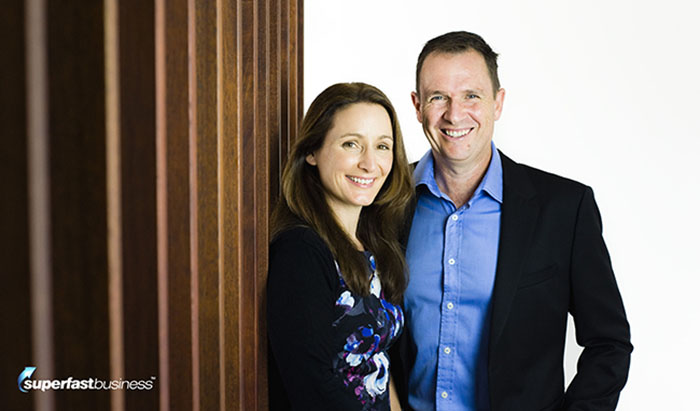
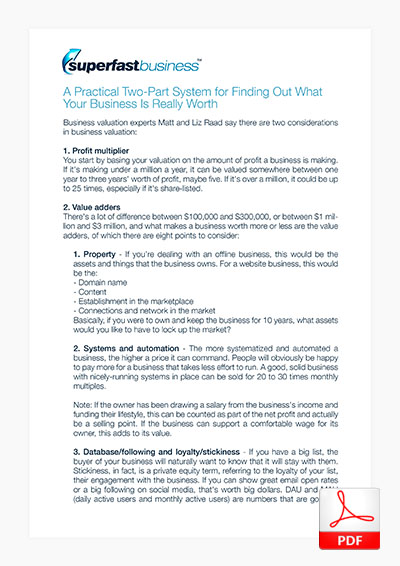









Leave a Reply